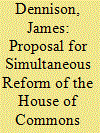| Srl | Item |
| 1 |
ID:
174012


|
|
|
|
|
| Summary/Abstract |
The disproportional electoral system of the House of Commons is increasingly contested, while the undemocratic composition of the House of Lords has been criticised for a century. I first argue that simultaneous reform of both chambers creates the opportunity for far more optimal outcomes than possible under attempts to reform just one chamber. I then argue that bicameralism should continue so that the UK can be represented in two, currently convoluted, ways: as a singular polity in partisan terms and as both an aggregate of constituencies and union of nations, in geographic terms. The former would best take place in a reformed House of Commons, responsible for government formation, and composed of around 300 MPs elected by ‘pure’ proportional representation. The latter would best take place in a reformed House of Lords of around 300 peers, elected by plurality voting from single‐member constituencies. Together, these reforms would improve governance, representation, legitimacy, accountability and the robustness of the union, while retaining celebrated facets of the status quo such as simplicity and the direct constituency link.
|
|
|
|
|
|
|
|
|
|
|
|
|
|
|
|
| 2 |
ID:
165564


|
|
|
|
|
| Summary/Abstract |
In this article, we consider the causes of the increase in voting for anti‐immigration parties in western Europe in the past decade. We first note that one of the most commonly assumed reasons for this increase is an associated increase in anti‐immigration sentiment, which we show is likely to be false. We also outline the major theoretical explanations, which we argue are likely to be incomplete. We then introduce our proposed explanation: these parties have benefitted from a sharp increase in the salience of immigration amongst some voters. We show that there are strong correlations over time between the salience of immigration and the polling of such parties in most western European countries. We argue that aspects of immigration in the last decade have activated pre‐existing opposition to immigration amongst a shrinking segment of the populations of western European states.
|
|
|
|
|
|
|
|
|
|
|
|
|
|
|
|